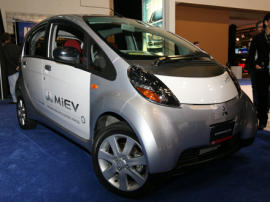Can U.S. close the battery gap?

Not made in America. How many tech devices are designed in Silicon Valley, Boston, Seattle or some other American tech center, manufactured elsewhere? From chips to iPods, we've gotten used to it. Now a consortium of lingering manufacturers in the U.S. want the feds to help them get the U.S. back into the battery race. They're asking for a billion dollars to build a battery factory to compete with those in Asia. There's even a chance that tech giant Intel will join the Yanks wanting to get into batteries.
Batteries, as readers of ZDnet know well, are crucial to the future of everything from hand-helds and laptops to plug-in cars and the electricity grid itself. Just how bad is the American battery makiing business? Recently HP announced it was buying newer, more efficient batteries from Boston Power, then making them available to laptop customers. Boston Power makes its batteries in Taiwan.
Yes, Virginia, there are American-made batteries
Imara is a lithium-ion battery maker running very much against the off-shoring trend. Imara is based in Menlo Park and makes their new tech batteries there. I spoke with Neil Maguire, VP of Business Development at Imara. He told me the manufacturing of the cells is being done at the headquarters to protect their proprietary process. Imara gained their technological edge by licensing a materials process developed at SRI. That independent laboratory was operating under a Department of Energy research contract set up in 1999. It was specifically aimed at making better batteries, especially aimed at the next generation of motor vehicles. Somebody was clearly thinking ahead. And this tech has not escaped to competing nations.
Early next year Imara expects to begin announcing some of their retail partners who will be using the new generation lithium-ion batteries in power tools, outdoor equipment and other products. The next generation of electric cars will also use lithium-ion technology, says Maguire. That includes the Chevy Volt, and the Mitsubishi iMiev.

One major advantage of the lithium-ion, he says, you get the same power with about half the battery weight as required from nickel-based batteries. In any portable use from laptop to vehicle, that's a big advantage. Imara is operating on VC funding, and not seeking any government loans.